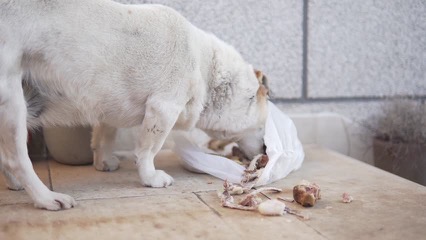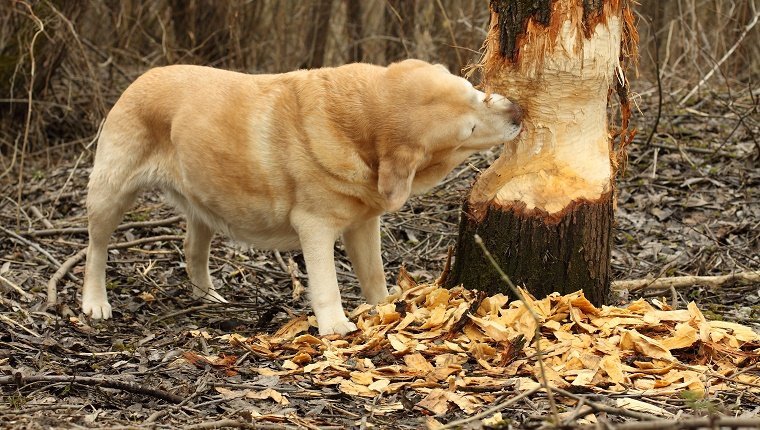It’s a fact that many dogs are poisoned by drugs each year. Accidental poisonings are common if dogs are able to access medications meant for their humans or are given human medications that are toxic to their systems. Today’s article will share some information on toxic medications, signs & symptoms that may indicate your dog is sick from drugs, and more.
Connect with a verified veterinarian in minutes. Licensed vets are available 24/7 to answer your questions. No need to worry about your furry family member.
Don’t Give Your Dog Human Medications
When your fur baby is not feeling well, is in obvious pain or discomfort, it’s difficult because you want to help them feel better in some way. Many pet parents turn to human medications to help ease their dog’s discomfort; however, human medications can be toxic to dogs. Unknowingly, these loving pet parents are poisoning their canine companion. What’s the problem—if the medicine works for us, why is it toxic for our dogs? Dogs don’t have the same enzymes that we do; without these enzymes, they can’t metabolize human medications in the same way we do, which leads them to become poisoned. In addition, giving a human dose of drugs to your dog may cause an overdose. Overdoses can lead to organ failure or even death. So never give your fur baby medication meant for humans, unless the vet has advised you to do so. In that case, make sure you only give your pup the dose the veterinarian has prescribed and no more. Human drugs that are toxic to dogs include:
- Antidepressants
- ADD/ADHD medications
- Sleep aids
- Acetaminophen (such as Tylenol)
- Ibuprofen (such as Advil or Motrin)
- Naproxen (such as Aleve or Anaprox)
- Beta-blockers
- Imodium
- Diphenhydramine (such as Benadryl)
- Percodan
- Claritan
- Aspirin (only when prescribed by your vet and at the specific dose they advise)
- Diet & weight loss drugs
- Thyroid hormones
- Cholesterol medications
This is not an exhaustive list; any medications that you take can be toxic to your dog.
Keep Medications Out of Your Dog’s Reach
Another common issue that leads to medication toxicity in dogs is leaving your medication where your fur baby can reach it. Some people keep their medication on a table near their favorite armchair. Or perhaps in a cabinet that their dog can easily access, especially if the cabinet is near the floor and easy to open. In these instances, where the dog can easily get to the medication, they may be tempted to chew on the bottles or packages, and then accidentally eat the medication. Be sure all medications are out of your dog’s reach. Make sure the medicine is up where he can’t reach and in a cabinet or other container that he can’t open.
You may need to use child-proofing methods when it comes to keeping your pup out of cabinets, etc.

Review symptoms, medications & behavior to keep your pets healthy with a Vet Online in just minutes.
Ask a Vet Live NowOverdose of Your Dog’s Medications
Sometimes pet parents accidentally overdose their pup’s by giving them too much of the pet’s medication. It’s easy to forget when the dose was taken, or even if it was taken. Not keeping track can easily lead to an overdose. In other cases, pet parents may believe the vet’s dosing advice is too low and think that more medication or medication taken more often will help their canine companion feel better. However, this can easily lead to a drug overdose. If your dog is on prescription medications, then it can be helpful to use a dose tracking app on your phone. You can set the app to remind you when the next dose is to be taken. You can even include the dose to be given at that time. Do this for each medication and be sure to give to your dog on time. Never give your dog a dose that’s larger than the vet has prescribed. Only do this if your pup’s veterinarian has said you should do this and then give the dose according to his direction.
What Should I Do if my Dog Has Been Poisoned?
First and foremost, you’ll need to stay calm. Next, make sure your fur baby isn’t able to access the medication(s) you believe he’s eaten or been exposed. Then, call your vet right away. If it’s after your vet’s office hours, then be sure to call their emergency number, or find the nearest emergency pet clinic that’s open near you. Once you have contacted the vet, then you’ll need to follow the vet’s instructions quickly, which may include taking your canine companion to the vet’s office right away, unless the vet makes house calls after hours.
Signs & Symptoms of a Drug Overdose in Dogs
Dog poisoning symptoms can include the following:
- Vomiting
- Drooling
- Excessive salivation
- Tremors
- Lack of coordination
- Frequent urination
- Disorientation
- Excessive thirst
- Agitation
- Pale mucous membranes
- Lethargy
- Irregular heartbeat (too slow or too rapid)
- Low blood pressure
- Depressed breathing (is too slow, or ceases to breathe)
- Seizures
- Stupor and coma
The symptoms your dog displays will depend on the type of medication he has eaten or been given. However, these are the most common signs and symptoms your fur baby’s experiencing an overdose. If your dog is displaying any of these signs and symptoms, and you believe he could have possibly eaten or been given medication of any kind, then call the vet. Take your pup to the vet’s clinic as soon as possible. This is an emergency and getting treatment as soon as possible may just save your dog’s life. It’s also helpful if you can give tell the vet what medication your dog probably been exposed to.
Additional information that can be helpful is the approximate time your dog took the drug(s) and what symptoms your dog has been showing, along with the severity of the symptoms.
Diagnosis of Medication Poisoning in Dogs
If you know what your date has been exposed or eaten, be sure to bring the package or the bottle with you to the vet’s. This information will be extremely helpful in making a diagnosis. Be sure to provide the information described in the previous section, too. The vet will then do a physical examination of your dog. They may check his vitals, and may also run tests that include bloodwork, urine tests, etc. Treatment will depend on your pup’s symptoms and any information you were able to provide the vet as to what your dog ingested. If your fur baby ate the medication fairly recently, the vet may choose induce vomiting and/or has the dog’s stomach pumped. The vet may give your dog activated charcoal, which works to bind the drug(s) in your dog’s digestive tract and keep them from being absorbed. If your pup has ingested delayed release medications, the vet may need to give your fur baby several activated charcoal doses over a period of time.
The vet may also order IV fluids for your canine companion, as these work to stabilize your pup’s blood pressure and work to dilute the drug(s) in the dog’s system, while also flushing it out faster. Depending on the type of drug(s) and your dog’s symptoms, it may be necessary for him stay over night at the clinic, so the vet can monitor his symptoms. Don’t be surprised if your dog needs to stay hospitalized a bit longer; the time he needs to be in hospital will depend on the medication and the severity of your pup’s symptoms. He’ll need to be monitored until all of he’s free of symptoms and his bodily functions are working as normal. In the next sections of this article, we’ll cover some commonly asked questions about specific types of medication overdose in dogs.
Can a Dog Overdose on CBD Oil?
Yes, it’s possible for a dog to overdose on CBD oil, just like any other type of medication or supplement. While dogs can safely take CBD oil, it must be given at the right dosage. If your dog takes CBD oil that contains THC (the psychoactive ingredient in marijuana), he can become high (intoxicated). Dog intoxication symptoms from CBD oil may include:
- Dry mouth
- Lowered blood pressure
- Drowsiness
- Lack of appetite
- Lethargy
- Light-headedness
If you notice your fur baby’s displaying these or any other concerning symptoms after ingesting CBD oil, then be sure to contact your veterinarian as soon as possible for proper medical advice. Depending on your dog’s symptoms, he may need to see the vet. CBD oil intoxication can last for several days, over which your pup may be extremely sleepy and not want to eat. When in doubt about your dog’s symptoms, be sure to call the vet ASAP.
Can a Dog Overdose on Benadryl?
While vets do prescribe Benadryl (also known as diphenhydramine) for canines, it is possible for your dog to overdose on this human medication. Vets sometimes prescribe this medication for allergies, motion sickness, to help calm them down, etc. However, never give your dog Benadryl without first consulting your vet. The medication must be given in the exact dose prescribed for your pet, otherwise, your fur baby could suffer an overdose. Your dog may suffer from these symptoms if he’s overdosed on Benadryl:
- Seizures
- Agitation
- Constipation
- Rapid heartbeat
- Dilated pupils
If you believe your canine companion has ingested Benadryl on his own, then he’s probably had too much. It’s important to call your vet and take your pup to the clinic as soon as possible.
Can a Dog Overdose Antibiotics?
While antibiotics are often prescribed for bacterial infections in dogs (and other pets), they can be toxic if taken in an amount larger than prescribed, or when taken more often. Some human antibiotics are also toxic to dogs. Antibiotic poisoning in dogs can lead to the following symptoms:
- Drooling
- Vomiting
- Diarrhea
- Lack of appetite
- Discolored teeth
- Problems with urination
- Skin lesions
- Tremors
Again, if you know or suspect your fur baby has ingested too much antibiotic medication, then call the vet as soon as possible. Drug overdoses in dogs is a very common problem. To avoid this issue with your fur baby, be sure to keep medications out of his reach; both his own and your drugs should be kept where he can’t get them. And never give your precious canine medications meant for you or others in your home. Human medications can be toxic to dogs. Remember, calling your vet and taking your fur baby to the vet’s office as soon as possible may just save your pup’s life.
Connect with a verified veterinarian in minutes. Licensed vets are available 24/7 to answer your questions. No need to worry about your furry family member.

Julie
Julie is a graduate of the University of North Carolina, Wilmington, where she studied Animal science. Though contrary to the opinion of her parents she was meant to study pharmacy, but she was in love with animals especially cats. Julie currently works in an animal research institute (NGO) in California and loves spending quality time with her little cat. She has the passion for making research about animals, how they survive, their way of life among others and publishes it. Julie is also happily married with two kids.
Review symptoms, medications & behavior to keep your pets healthy with a Vet Online in just minutes.
Ask a Vet Live Now



